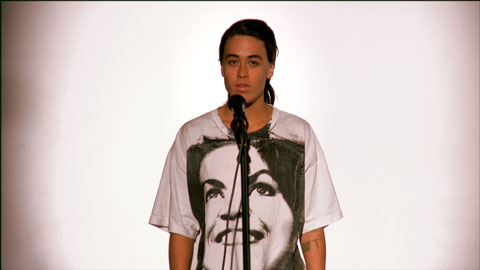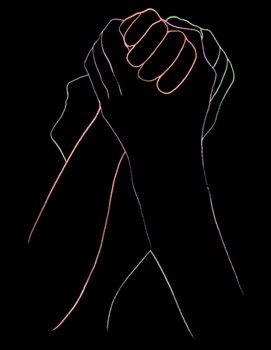1–2 February 2013
The Tanks at Tate Modern
Bankside, London
SE1 9TG
www.tate.org.uk
A collaboration between Tate Modern and Electra
Charming for the Revolution is an experimental congress of
artists, activists and thinkers who seek to unpick underpinning,
pressing questions of contemporary sexual and gender politics; exploring
strategies that divert and destabilise normative gender and
its representations. The series of events gathers several major
international figures who explore radical expressions of sexuality and
gender. Their work invokes what Kathy Acker called the ‘languages of
wonder, not of judgment’ to imagine new paths to liberation and social
justice. This constellation of events at Tate Modern will highlight a
range of positions, representations and manifestos to assess and debate
an exciting, emerging field of shifting identities, active communities
and political dreams.
The series features films, performance and a major international symposium and brings together the UK premiere of
Wu Tsang‘s award-winning film
Wildness alongside a new performance by
Kelela,
Ashland Mines, and
Wu Tsang; a symposium convened by
Carlos Motta with
Xabier Arakistain,
Giuseppe Campuzano,
J. Jack Halberstam,
Esben Esther Pirelli Benestad, Beatriz Preciado,
Dean Spade,
Terre Thaemlitz,
Wu Tsang,
Del LaGrace Volcano and
Campbell X; a new performance by
Carlos Motta and
Matthias Sperling; and a screening of works by
Pauline Boudry/Renate Lorenz.
Pauline Boudry/Renate Lorenz Friday 1 February, 19h
The work of Berlin-based artist duo
Pauline Boudry/Renate Lorenz
reflects on the interplay of sexuality, sexual perversions and
representation, continuously returning to unrepresented or illegible
moments in history. This screening and artists’ conversation brings
together three recent works by Boudry/Lorenz: a staging of punk archives
from a period between 1970 and 2031 in
No Future/No Past; a radical reimagining of the housewife set in Berlin Zoo in
Charming for the Revolution; and a layering of labour, class, desire and drag in
Normal Work. Here a host of characters are portrayed, living—indeed thriving—in defiance of convention, law and economy.
Gender Talents: A Special AddressSaturday 2 February, 10.30–16.30h
Gender Talents: A Special Address, convened and moderated by artist
Carlos Motta,
presents an international group of thinkers, activists and artists in a
symposium that uses the manifesto as a structure. These ‘special
addresses’ will explore models and strategies that transform the ways in
which society perversely defines and regulates bodies. The event asks
what is at stake when collapsing, inverting or abandoning the gender
binary.
Participants:
Xabier Arakistain,
Giuseppe Campuzano,
J. Jack Halberstam,
Carlos Motta,
Esben Esther Pirelli Benestad, Beatriz Preciado,
Dean Spade,
Terre Thaemlitz,
Wu Tsang,
Del LaGrace Volcano, and
Campbell X.
Carlos Motta and Matthias Sperling: The Movers Saturday 2 February, 16.30h
Free
The Movers is a performance conceived in collaboration between
Carlos Motta and choreographer
Matthias Sperling.
The work attends to movement as a means of exploring the connections
between collective politics and a sense of the individual. Based on a
choreographic score of performative tasks that engage thirteen
performers in individual decision-making processes,
The Movers abstractly asks how self-determination is both a deeply personal project and continuously negotiated in relation to others.
Performers:
Ingo Andersson – Wotever World, Jason Barker, Dan
Daw, Simon Foxall, Fred Gehrig, Nia Hughes, Jamila Johnson Small, Helka
Kaski, Huai-Chih Liang, Vicky Malin, Malinda Mukuma, Carlos Maria
Romero, and
Mickel Smithen & Ebony Rose Dark.
The Movers is part of
Gender Talents, a Creative Capital Project.
Wu Tsang: WildnessSaturday 2 February, 20h
Wildness
is a portrait of the Silver Platter, a historic bar on the eastside of
Los Angeles that has catered to the Latin immigrant and queer community
since 1963. With a touch of magical realism, the bar itself becomes a
character in the film. Voiced by a transgender actress from Guatemala,
it whispers the histories of the LGBT community for whom it has provided
sanctuary and a ‘safe space’ for generations.
The film captures the creativity and conflict that ensue when a group of young, queer artists of colour (
Wu Tsang, DJs
NGUZUNGUZU and
Total Freedom)
organise a weekly performance party, also called Wildness, at the bar.
This emergent underground interfaces with the immigrant transwomen who
have long populated the venue and the Silver Platter becomes a charged
forum for forging coalitions and exploring class, community
and activism.
Kelela, Ashland Mines, and Wu Tsang: Breakdown Saturday 2 February, 21.30h
Free
Breakdown is a performance conceived for the Tanks by
Kelela,
Ashland Mines, and
Wu Tsang.
Part grand illusion and part humble direct action, this stage show is
meant to explore the idea of honesty. Honesty not in the sense of being
morally upright, but in the sense of being true to desires or needs. The
artists use basic elements of voice, sound, and light to create
continuity (storytelling) through a series of constructions/breakdowns,
in which the song is simultaneously the derivative and the original.
Breakdown is part of an ongoing series of parties/sound/experiences that began in Los Angeles.
A combined ticket for all events is available.
Tate Film is supported by Maja Hoffmann / LUMA Foundation.
Electra is supported by Arts Council England.
Realised with the kind support of Creative Capital, IFA The Institut für Auslandsbeziehungen and the Norwegian Embassy.





